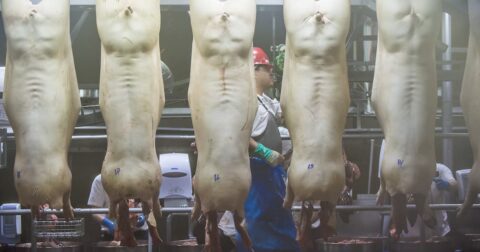Investigation
Meat Processing Plant Complaint Highlights Supply Chain Disruptions — And How the Meat Industry Isn’t Prepared
Food•4 min read
Reported
A team of third-party experts will help seven JBS plants reduce employee coronavirus exposure and prepare for future outbreaks.


Words by Madison McVan, Investigate Midwest
The Occupational Safety and Health Administration (OSHA) is requiring JBS, one of the largest meatpacking companies in the country, to take steps to prevent future disease outbreaks at seven of its plants.
The settlement announced in late May signals the resolution of two OSHA citations issued to JBS for failing to protect workers from the coronavirus at its Greeley, Colorado, and Green Bay, Wisconsin, meatpacking plants.
JBS must work with third-party experts to evaluate work areas and other places where employees congregate and develop an infectious disease preparedness plan.
In addition to the two plants that received citations, five other facilities owned by JBS or JBS subsidiaries are included in the settlement.
The other JBS-owned plants named in the settlement are:
“This settlement is intended to ensure that, going forward, protective measures are in place to protect workers at these facilities from COVID-19 and from other infectious diseases as well,” OSHA Regional Administrator Jennifer Rous said in a press release. “This settlement will positively impact the safety and health of JBS employees far beyond the two facilities where these inspections occurred.”
JBS did not immediately respond to a request for comment.
The team of third-party experts and company representatives will also review the company’s existing procedures and occupational health system; develop recommendations for ventilation, employee and visitor screening protocols, cleaning, and other engineering and administrative controls; identify personal protective equipment needs and stockpile for potential future needs; and address other issues related to infectious disease preparation and response.
Countrywide, at least 12,859 JBS employees have contracted coronavirus and 62 have died, according to a Congressional investigation.
In mid-2020, following large COVID-19 outbreaks, officials from the Centers for Disease Control and Prevention inspected the Cactus and Greeley facilities.
At the Cactus plant, the officials identified a few issues, including those with its screening process. There was crowding in locker rooms and no social distancing while workers waited in line to have their temperatures read. The CDC also found problems with the thermometers: “It was reported that the thermal camera would not work on workers with dark skin color and that the handheld infrared thermometer did not work if the worker was sweaty.”
JBS reduced the number of workers allowed on the buses it contracted to bring workers to the plant and required everyone to sit near a window, according to the CDC’s report. For workers who carpooled in 15-passenger vans, the company provided drivers with training, facemasks, hand sanitizer, and thermometers.
At the Greeley facility, CDC officials did not report any issues with how the plant screened workers at the plant’s entrance. But their report recommended that “all site entrants… be screened, regardless of the time they arrive or gate they use at the site. For example, maintenance workers who arrive early need to be screened.”
Notably, the settlement excludes several JBS plants where large coronavirus outbreaks occurred.
At a JBS plant in Worthington, Minnesota, at least 791 workers were infected and 3 died, according to Investigate Midwest tracking.
And in Hyrum, Utah, at least 758 JBS employees—more than half of the plant’s workforce—contracted coronavirus, and one person died.
An OSHA spokesperson said the seven plants included in the settlement were chosen because they are located in states where federal OSHA has jurisdiction. In 22 states, including Minnesota and Utah, state-level workplace safety agencies have primary oversight over worker health.
The settlement only compels JBS to implement infectious disease preparedness plans at the seven plants named in the settlement, but the company could choose to apply the plans to other facilities.
“As a general matter, an employer who recognizes a serious hazard and feasible means to materially reduce that hazard but fails to implement those means risks future OSHA enforcement actions,” the OSHA spokesperson said.
In the early months of the pandemic, JBS resisted intervention from public health authorities in Greeley, Colorado, as its employees were getting sick. JBS has denied on several occasions that its employees contracted coronavirus at work.
The county public health shut down the plant for two weeks in April 2020, but by the end of July of that year, five employees died, 51 had been hospitalized and 290 were infected.
The county public health director in Greeley retired in May 2020 after facing mounting pressure from JBS and other businesses to reopen businesses despite coronavirus risks.
OSHA also issued eight citations against JBS in Greeley in September for workplace safety hazards including dangerous lifting processes and hazardous chemical and training violations after an employee died from falling into a vat of chemicals.